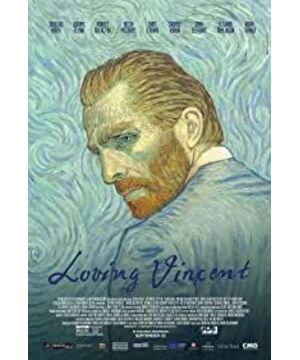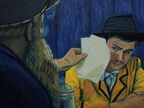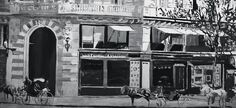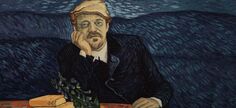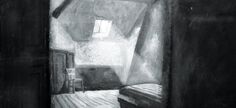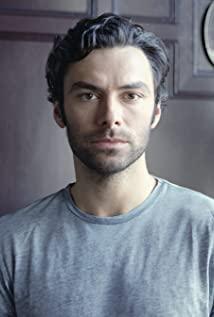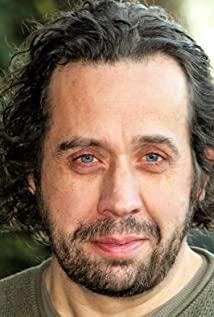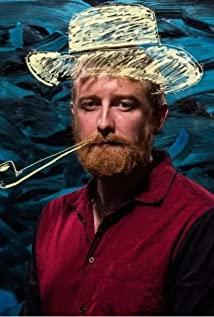quality of the animation is amazing. Twelve frames per second, except for a few places where there is a sense of stuttering, the other pictures are smooth and the movements are not stiff at all. There are even places where the action speed is fast, and the virtual action is also used. The technology of the camera lens position is amazing. When the 3D camera moves, it is completely hand-painted, and there are even details such as fisheye and picture distortion. I don't know if it was filmed with a camera and then repainted, or if the artist just painted the scene, but I guess the former is more likely. Of course, this is also very amazing artistry. In Disney's animations, Moulin Rouge, etc., the artist took the glass plate to draw the background behind it. The texture of this Van Gogh painting is certainly indescribable. The animators are really great. I heard about this animation a long time ago, and it took so long to come out, and I can imagine how much engineering is involved. The background behind sometimes moves and sometimes does not move. It should be created in layers. The details are very detailed. The strokes of the lights in the background will change, and the stars in the sky will change little by little. The light is very beautiful. This light-dark relationship is represented by Van Gogh's large oil brushstrokes. Each frame can clearly see that the light is expressed by different brushstrokes. It is very beautiful and has a hand-painted beauty. The details of the characters are not completely consistent. This rough and dynamic feeling makes people feel the temperature of the people in the animation. What impressed me most was the crow, not the crow flying away in the tribute to the crow in the wheat field, but a scene where the crow flew up, and then flew out of the camera to the audience. The image of the crow outlined by the freehand brushstrokes, coupled with the dubbing, this is the animation style I admire the most. It is abstract, but the expression will not confuse the audience at all, and it is very beautiful.
This is the first time I have seen this kind of pure oil painting animation. Canadian personal animators often use some very interesting Medium to create. I have seen the Street that is closest to this one, which should be caroline leaf, which is created with paint on glass. I can imagine that it is a large amount of work. , but a drawing board such as glass can also be wiped off, and oil painting is a real piece of art, something drawn by more than 100 artists. Salute again.
2. Story level
The story is designed with a suspense, which is the truth of Van Gogh's death. Layer by layer, everyone in the town told a different story. The selling point of the animation was originally on the pure oil painting animation, but the story was also very exciting, not lazy at all, and carefully designed. The story begins when the hero is entrusted by his father to find the truth and visits different people.
The waitress at the tavern where Van Gogh lived told a story that the quiet life-loving Van Gogh was tricked by the doctor's family.
The doctor who issued the death certificate said that Van Gogh was shot because of the angle of the shot and because the scene was cleaned up.
After the male protagonist was persuaded, combined with the observation, he came to the conclusion that Van Gogh was killed by a friend who was drinking with him, but he did not want to drag the friend down.
And Van Gogh's closest person in the town, the doctor entrusted by his brother, said that he committed suicide and was hurt by his own words. Including the doctor's daughter is also to blame.
The last thing I want to say is that Van Gogh was born with pain as a genius. No matter how he died, he didn't want to live anymore in the end. The small town can't hold him. To put it in a big way, the world can't hold him. The important thing is that he loves life. He has created.
I feel like none of these are the right things. I haven't read any of Van Gogh's biographies, just a general understanding of his life. Judging from the narrative of the film, Van Gogh should have been under a lot of mental pressure and suffered severe depression. He has a strong desire to create within himself, and at the same time feels that he is dragging down other people around him. Let him work, he feels that he has no way to do it, his desire to create is too strong, but his younger brother has to provide for him to create, there is no way to have a normal life that should have been better. Coupled with the fact that people in the town regarded him as a weirdo, he should have always had a strong suicidal tendency.
He doesn't want to live anymore, if given the chance, he will die. But for such a big thing, he hasn't touched the last straw that broke him. And when he dies, his brother will be sad too.
So the movie believes that he wants to die anyway, and that death is his own choice and inevitable. But if, from every possibility, if if the drunk boy didn't shoot him, if the doctor's daughter was more accepting of Van Gogh, or if the doctor didn't say that his paintings can't make money, the most If it hits Van Gogh's heart, he will not die, he will continue to choose on that edge, it is very dangerous, but if the world is a little more gentle to him, then a little bit, he may live another half a year, or even a few more. Moon, when his paintings became famous, everything was different. He has money and fame, and he can pay off his younger brother's debts, and he can also create more splendid and colorful colors that we may not even be able to imagine.
Even if the world is a little more gentle to him.
But the straw was still on him. He ran out, shot himself, or was shot by someone else, and just died. This is not something inevitable. Don't blame him, we can't say he's not strong enough, as in the movie, the world can take the strong, this is how the world is, so intolerant and mean to people who are different from him. It's not like most books, or chicken soup, say that the world's opinion doesn't matter. The vulgar world, so important to Van Gogh, was the key to his life. In any case, geniuses such as Van Gogh are surrounded by such a secular world. He didn't have the financial resources to look down on the world, he didn't stand at the top of the society, and he was not recognized by the society. As a result, he was just buried around to suffocate and die. It wasn't someone who killed him, and it wasn't the unkindness of the town's residents. Even if people say it is terrifying, the ridiculous pointing of the small town residents we see, the isolation of him is only one-tenth, one-percent projection of the world's malice towards him. Mediocre people are not friendly to geniuses, don't blame them, imagine if a hundred geniuses surrounded an ordinary person, it would be the same ending, ordinary people might die faster. Human nature is inherently incapable of understanding each other, and there is no way to tolerate heterogeneity. Even Theo's love for Vincent becomes the knife that kills him in this particular setting. This money supports him, and at the same time, it consumes Vincent little by little. All we can say, it seems, that he just had the natural death of a genius. Van Gogh was not very lucky, the world did not give him enough tolerance.
3.
In fact, no one understood him, from beginning to end.
The barmaid thought that Van Gogh was suave, shy, and always happy, but the doctor pointed out the pain and loneliness in Van Gogh's heart: the bright stars in the night sky, but the endless darkness and loneliness surrounding the stars. The doctor's daughter, who saw only that he was a great genius.
Including the male lead, he's actually a bit like how the world embraced Van Gogh. From the beginning, I thought this man was a lunatic, but then I got to know his inner thoughts little by little, and I became admiring him, and even resented that the world did not accept Van Gogh. The fisherman who stood idly by quarreled. But he still thought he was crazy at first. He was actually a member of the world that killed Van Gogh. In the end, the level of understanding of the male protagonist is that Van Gogh is a good person and a genius, but he doesn't know the slightest bit about genius. Sigh, it doesnt matter. It may be to find an excuse for yourself and reconcile with yourself, just like the world.
Perhaps the person who knew him best was the doctor. Fans should love their idols a little harder.
View more about Loving Vincent reviews


